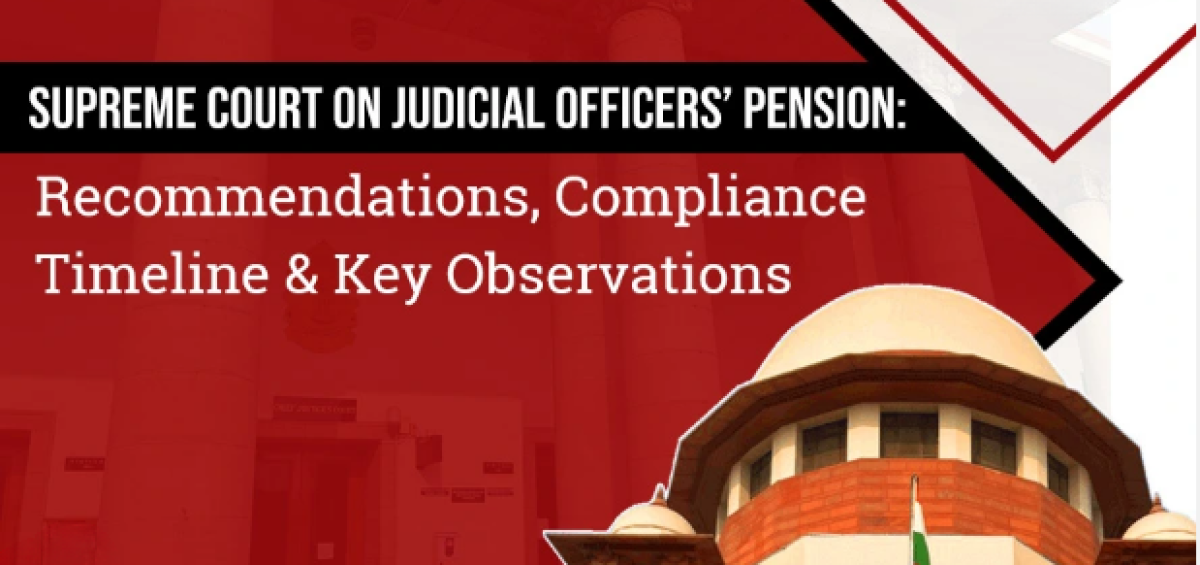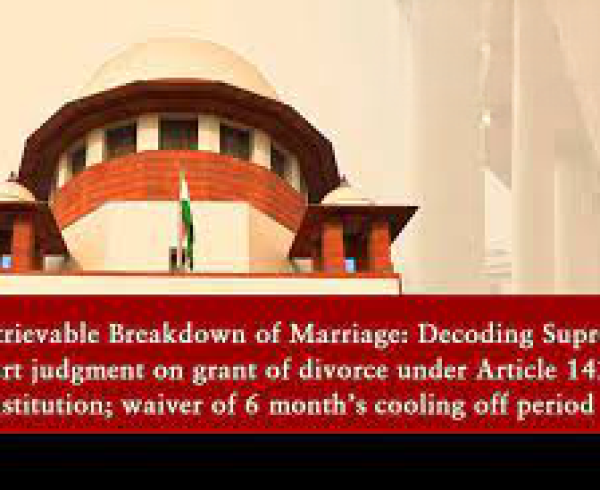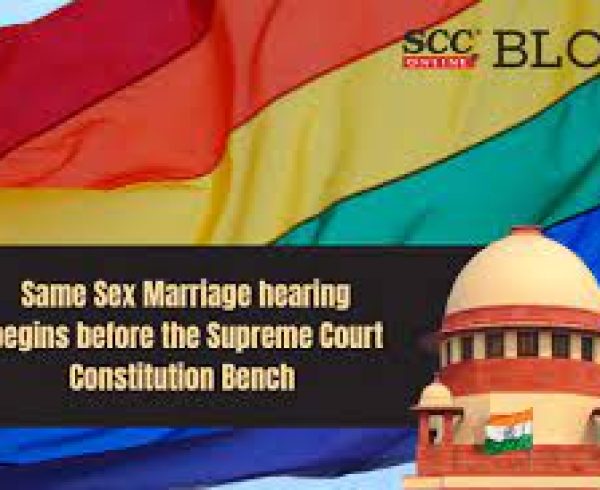“To be truly unified both in form and in substance, there must be integration in terms of pay, pension and other service conditions between the District Judiciary, the High Courts and the Supreme Court. Hence, any increase in the salary of the judges of the High Court must reflect in the same proportion to the judges in the District Judiciary.”
Supreme Court: Giving an important ruling on Judicial Officers’ pension, the 3-judge bench of Dr DY Chandrachud, CJI and V Ramasubramanian and PS Narasimha, JJ has observed that for efficient functioning of judicial system, it is necessary that judges of caliber and capacity are provided with the right incentives and promotion opportunities to maintain the high level of functioning of the judiciary.
The Court has, hence, directed the High Courts and the competent authorities, to carry out necessary amendments in Service Rules of the Judicial Officers across all jurisdictions, to bring them in conformity with the following accepted recommendations within a period of 3 months:
Accepted Recommendations
- No change in pension for those retiring after 01.01.2016- the pension/family pension shall be @50% / 30% of the last drawn pay at the time of retirement.
- Revised pension of retired judicial officers would be 50% of last drawn pay.
- Formulations as given in Report to apply for pension revision: (i) Multiplier factor of 2.81 to be applicable for pension; or (ii) Pensioners to be fitted appropriately in the fitment table (Table II, para 13.3, Ch. II, Vol. I, p. 73) whichever is higher. [To be read with the Corrigendum dated March, 2021]
- Judicial officers who retired prior to 01.01.2016 to be placed notionally at the corresponding stage. [To be read with the Corrigendum dated March, 2021]
- For judicial Officers who retired prior to 01.01.1996, if no consequential re- fixation has been done by the Government concerned based on the directives of this Hon’ble Court, the said benefit shall be extended to them first without further delay. [To be implemented immediately]
- The benefits of number of years of practice at bar subject to maximum of weightage of ten years will be given to direct recruits of HJS who retired prior to 01.01.2016.
- For family pensioners, no change is suggested in the existing percentage of family pension, that is, it shall be @30% of last drawn pay at the time of retirement of the Judicial officer
- Family Pension @30% shall be paid to eligible family member(s) as given in Rule 54 CCS (Pension) Rules 1972 at par with the spouse, after the death of the spouse.
- The quantum of family pension shall be worked out in the same manner as quantum of pension is worked out.
- Income limit, if any prescribed by any State in relation to dependent family members (other than the spouse) for being eligible to get family pension shall be not less than Rs.30,000/- per month (rupees thirty thousand per month). [States may grant more beneficial position Additional Quantum of Pension/Family Pension]
- Additional quantum of family pension on completion of age of and at the rates specified as per Table in p.49, Vol. II Part-I. This benefit of additional pension shall be available to all eligible pensioners/family pensioners w.e.f. 01.01.2016.
- No recovery shall be effected from those who have availed the benefit of additional pension on completion of age of 65 or 70 years as per the extant orders of the some of the State Governments
- The State Governments may also choose to continue to extend the prevailing benefits upto the age of 75 years to the retired Judicial officers as well.
- Retirement gratuity shall be calculated as per Rule 50(1)(a) of CCS (Pension) Rules 1972.
- The maximum limit for retirement gratuity/death gratuity shall be Rs. 20 lakhs which shall be increased by 25% whenever DA rises by 50%.
- These recommendations shall be effective from 01.01.2016.
- To the officers who have retired after 01.01.2016 and paid retirement gratuity as per pre-revised pay and the maximum limit at that time, the differential gratuity payable on account of revision of pay shall be paid subject to the revised maximum limit.
- The death gratuity shall be paid as per table in p.52, Vol. II on the basis of length in service
- No change in retirement age of 60 years recommended
- The benefit of family pension as per Rule 54(3) of CCS (Pension) Rules, as amended vide notification dated 19.09.2019 shall be extended to the family members.
- The other benefits such as one time lumpsum grant, compassionate appointment, permission to stay in official quarters etc. already in force in the States shall continue to apply, in addition to death gratuity.
Consequently
- The Compliance affidavits are to be placed on record by the High Courts, the States and the Union within four months.
- The compliance affidavits must be filed by all States and Union Territories by 30.07.2023 that the arrears of pay have been positively credited into the accounts of the concerned officers.
- The approved revised rates of pension to be payable from 01.07.2023.
- For the payment of arrears of pension, additional pension, gratuity and other retiral benefits, 25% will be paid by 31.08.2023, another 25% by 31.10.2023, and the remaining 50% by 31.12.2023.
Key Observations
- A unified judiciary necessarily entails that the service conditions of judges of one state are equivalent to similar posts of judges of other states. The purpose of this constitutional scheme is to ensure that the judicial system is uniform, effective and efficient in its functioning.
- Judicial Officers have been working without a pay revision for nearly 15 years. In contrast to the 7th Central Pay Commission, which was implemented from 01.01.2016, judicial officers have not received any similar benefit.
- The independence of the District Judiciary must also be equally a part of the basic structure of the Constitution. Without impartial and independent judges in the District Judiciary, Justice, a preambular goal would remain illusory. The District Judiciary is, in most cases, also the Court which is most accessible to the litigant. On a single day, the District Judiciary handled nearly 11.3 lakh cases. During the period of the pandemic as well, the District Judiciary was yet efficient and undertook its functions to ensure that justice is delivered in a timely manner. It is thus important to recognize that the District Judiciary is a vital part of the independent judicial system, which is, in turn, part of the Basic Structure of the Constitution.
- The rights of “access to justice” and “fair trial” cannot be exercised by an individual without an independent judiciary. Further, without fair and speedy trial, the remaining rights, including fundamental and constitutional rights will not be enforced in a manner known to law. If these instrumental rights themselves are hindered, then all other rights within the Constitution would not be enforceable. The essential function of the District Judiciary, as also the function of the High Courts and this Court is to administer justice impartially and independently. Together, the Courts constitute the unified judicial system performing for the core and essential function of administering justice. To be truly unified both in form and in substance, there must be integration in terms of pay, pension and other service conditions between the District Judiciary, the High Courts and the Supreme Court. Given that in the hierarchy of the unified judicial system a Judge of the High Court is placed above a District Judge, it follows that a District Judge cannot have more pay more than a High Court judge. Therefore, the maximum ceiling of pay that a District Judge may earn is the salary of a High Court judge which is fixed under the aforementioned statute. Once the salary of the District Judge is pegged against the High Court judge, it thus follows that any increase in the salary of the judges of the High Court must reflect in the same proportion to the judges in the District Judiciary.
Recommendations yet to be considered
The Court will next take up the matter on 17.7.2023 for further compliance on pay and pension and for consideration of the following recommendations:
- Special attention shall be bestowed to them by rendering due assistance for processing the medical bills of the pensioners/family pensioners who are too old, infirm or differently abled or undergoing in-patient treatment for serious ailment
- District Judge shall nominate a Nodal Officer for liasoning work, if required, in emergency in facilitating admission in the hospital and getting the medical bills of the pensioners/family pensioners cleared promptly.
- Special Cell entrusted with the responsibility of the processing the representations of the pensioners/family pensioners and to initiate action as may be considered appropriate to redress the grievance expediously, shall be created in the High Court under the supervision of an officer of the rank of Joint Registrar, in the High Court.
- A Judge of the High Court shall be nominated to oversee the functioning of Special Cell and issue necessary instructions.
- The representatives of the Retired Judges Associations shall be permitted to meet the Registrar General of the High Court atleast once in a year to discuss the problems, if any.
- The Registry of the High Courts to compile data of the pensioners and family pensioners.
- The National Pension System (NPS)/Defined Contributory Pension Scheme shall not be applicable to all judicial officers.
- The Defined Benefit Pension Scheme/Old Pension Scheme shall be applicable to all Judicial officers irrespective of the date of their joining the judicial service.
- For those who have judicial service after 01.01.2004, the contributions together with the returns earned thereon will be refunded to them or transferred to their GPC account.
- The Government shall facilitate opening of the GPF Account of the new entrants to the judicial service after 01.01.2004 and transfer their contribution with the returns earned thereon. [All India Judges Association v. Union of India, 2023 SCC OnLine SC 673, decided 19-05-2023].
Source Url:






Leave a Comment